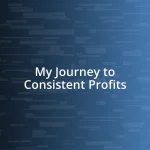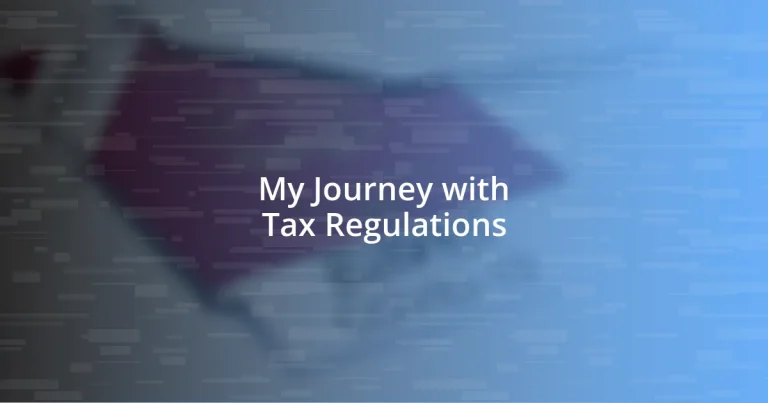Key takeaways:
- Tax compliance is essential for reputation, financial stability, and community contribution, impacting relationships with lenders and overall confidence.
- Common challenges include complex terminology, frequent changes in regulations, and the need for thorough documentation, which can lead to anxiety about audits.
- Staying organized, utilizing technology, seeking professional help, and engaging in ongoing education are crucial strategies for effective tax navigation and planning.
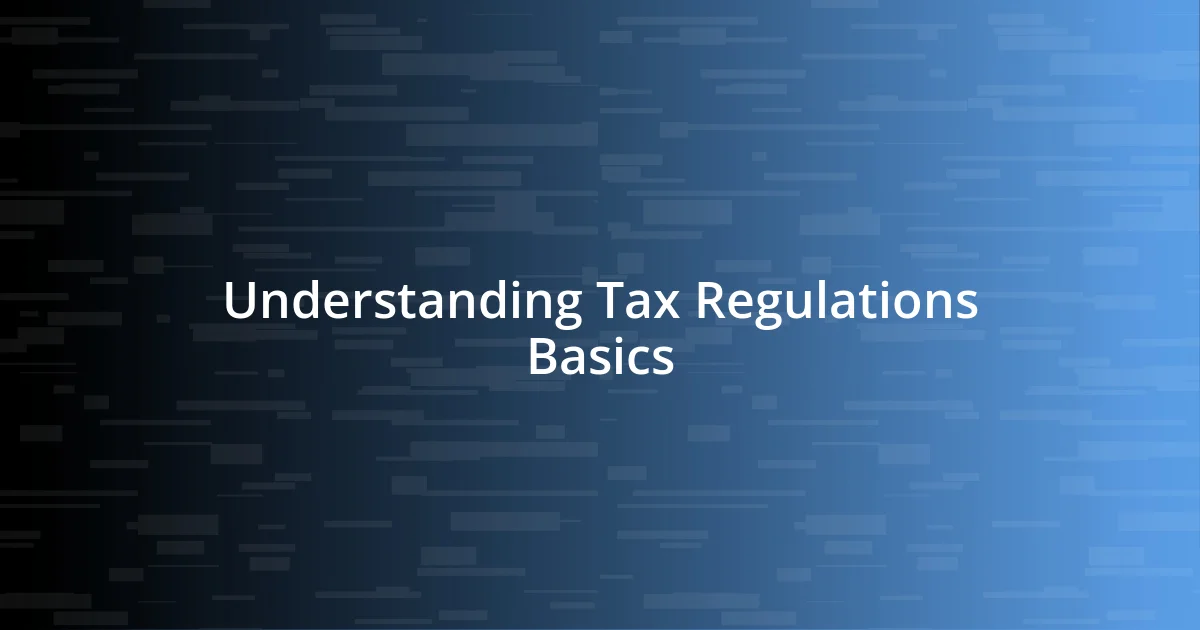
Understanding Tax Regulations Basics
Tax regulations serve as a framework for how individuals and businesses report their income and pay taxes. I remember the first time I delved into tax codes; it felt like jumping into a deep end of a pool with no lifeguard in sight. Does anyone else feel a sense of dread just thinking about tax season?
Understanding key terms is crucial. For example, “deductions” can actually lessen your taxable income, but do you know how to identify what qualifies? I learned the hard way that not everything is deductible, and what seemed straightforward often had hidden complexities.
Navigating through tax regulations can feel overwhelming, especially with all the changes that pop up each year. I once missed a non-profit status exemption that could have saved me a significant amount. Reflecting on that, I often wonder if others have faced similar challenges and how they overcame such pitfalls.
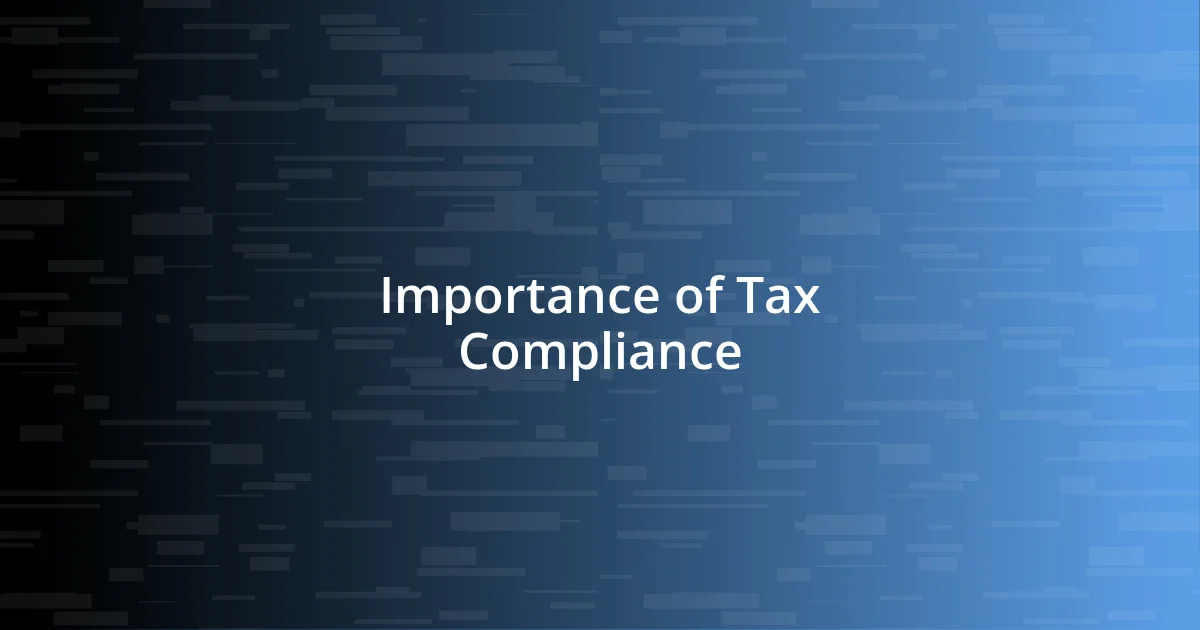
Importance of Tax Compliance
Tax compliance is not merely a legal obligation; it shapes an individual’s or business’s reputation. I recall the nervousness I felt when applying for a business loan. It struck me that my tax compliance history played a pivotal role in the lender’s decision. I observed how having clean, up-to-date records not only instilled confidence but also opened doors for further financial opportunities.
Additionally, remaining compliant prevents costly penalties. I remember a colleague who underestimated the value of timely tax filings. When he finally faced a hefty fine, he confided in me that the stress was far worse than he anticipated. It made me realize that while tax rules may seem tedious, the repercussions of ignoring them can be profoundly impactful.
Finally, tax compliance fosters a sense of community contribution. Each time I submit my taxes, it feels like I’m playing a part in something bigger. The roads I drive on, the schools I pass, and even public services all thrive on tax contributions. Reflecting on this, I often feel a wave of responsibility—and it encourages me to be a proactive participant in society.
| Aspect | Importance |
|---|---|
| Reputation | Affects trust with lenders and partners. |
| Financial Consequences | Prevents fines and penalties. |
| Community Impact | Supports public services and infrastructure. |
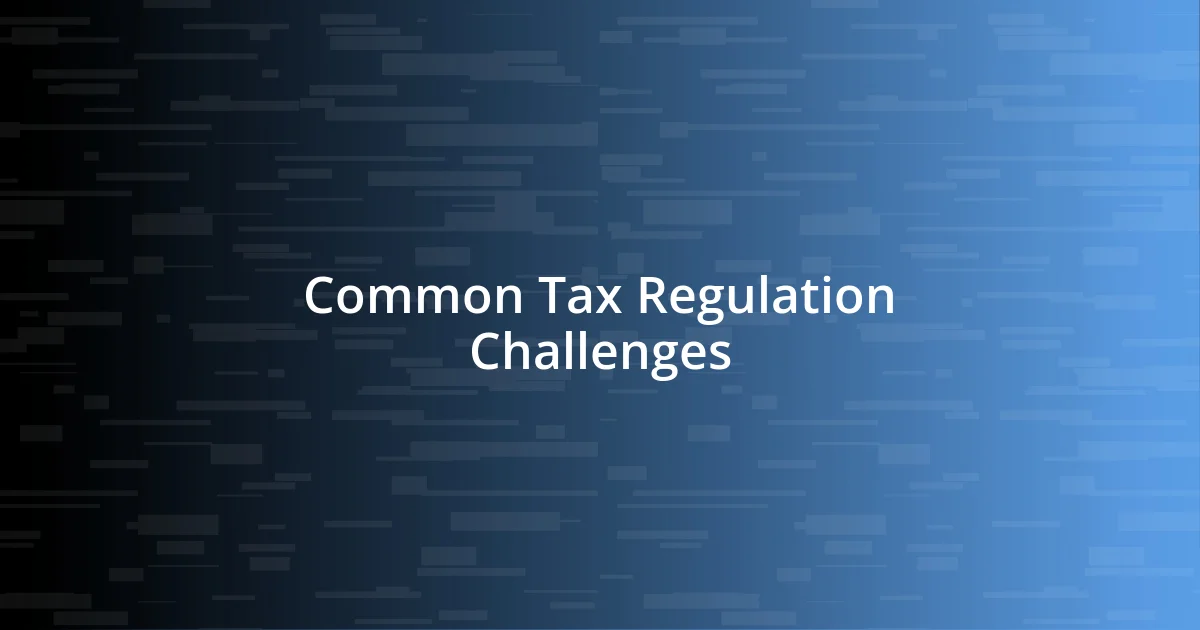
Common Tax Regulation Challenges
Tax regulations can present various challenges, and one common hurdle is the ever-changing landscape of tax laws. I vividly recall a tax season where significant changes were introduced, leaving me scrambling to understand how they would affect my situation. It’s easy to feel lost, and sometimes those changes bring about unintended consequences, like missing out on potential savings because I didn’t know about new credits or deductions.
Here are some frequent challenges people face with tax regulations:
- Complex Terminology: Tax jargon can be confusing. I often find myself needing to google terms like “tax credits” and “carryovers” just to grasp their implications.
- Frequent Changes: Regulations evolve yearly. That constant flux can create stress, especially when deadlines loom.
- Documentation Requirements: I once underestimated the importance of keeping thorough records. A few missing receipts led to headaches during my last audit—definitely a lesson learned!
- Fear of Audits: The mere thought of an audit can keep anyone up at night. I’ve doubled down on compliance measures just to keep that anxiety at bay.
As I navigated these waters, I realized that staying proactive and informed is crucial in tackling these challenges. Each year, I find myself preparing earlier and researching extensively, allowing me to face tax season with more confidence.
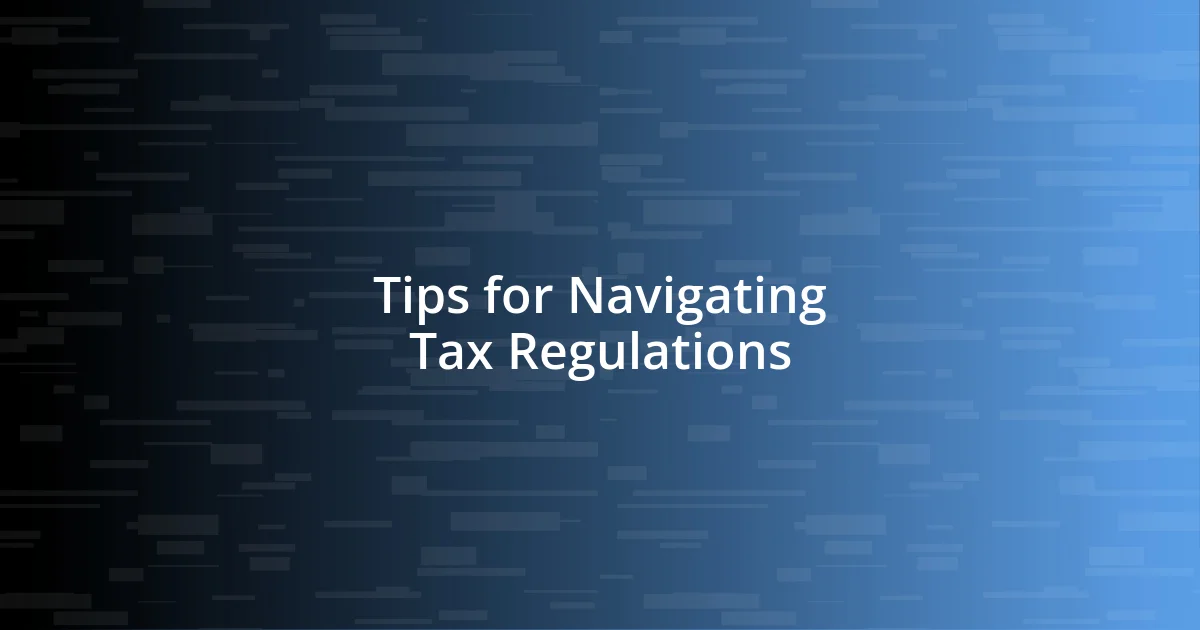
Tips for Navigating Tax Regulations
When it comes to navigating tax regulations, I’ve learned that organization is my best friend. Each year, I create a dedicated folder for receipts and documents. It feels satisfying to see everything neatly in one place, and I can’t help but think about how this simple habit saves me time and stress during tax season. Have you ever scrambled through old papers at the last minute? I know I have, and trust me, it’s not a fun experience.
Another tip that has proven invaluable is to leverage technology. I remember when I first started using tax software; it was like having a trusted advisor at my fingertips. The automation features not only streamline calculations but also prompt me to consider deductions I might have overlooked otherwise. Isn’t it amazing how a tool can turn a daunting task into something manageable? I can confidently say that those programs have aided me in filing accurately and on time more than once.
Lastly, seeking professional help can be a game-changer. I was hesitant to consult a tax advisor at first, fearing it was an unnecessary expense. However, after a couple of exhausting tax seasons spent wrestling with regulations, I decided to take the plunge. The insights they provided not only clarified complex issues but also maximized my returns. I often reflect on how that decision brought a sense of relief and security. Have you considered when to bring in an expert? It might just be the step that transforms your tax experience from stressful to straightforward.
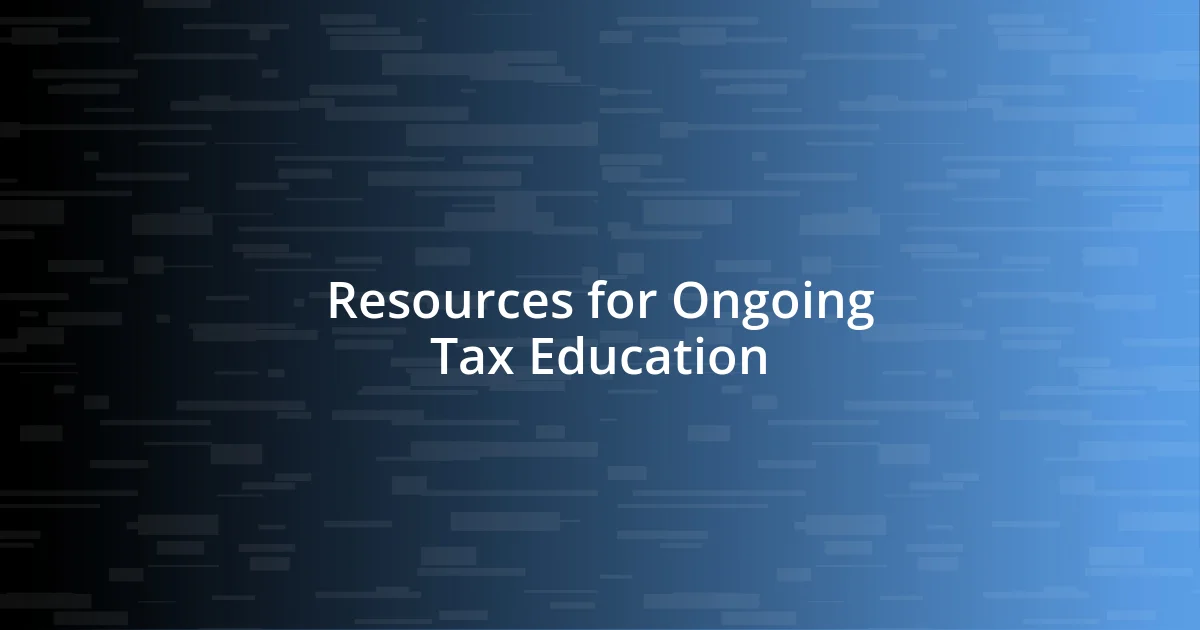
Resources for Ongoing Tax Education
There’s a wealth of resources available for ongoing tax education that can truly empower anyone looking to stay informed. For instance, I can’t emphasize enough how helpful IRS webinars have been for me. They break down complex topics into digestible segments, allowing me to learn directly from the source. Have you ever joined a live session? The opportunity to ask questions in real-time adds a layer of clarity that’s often missing from traditional reading materials.
In addition to government resources, I find that community discussions are incredibly insightful. Joining online forums, like those on Reddit or specialized tax websites, offers a chance to share experiences and learn from others’ mistakes. I vividly recall a discussion about overlooked deductions that saved a fellow user a significant sum. When I shared my experience too, it created a sense of camaraderie and support in what can feel like a solitary struggle. It’s refreshing to know you’re not alone in this journey.
Books and podcasts are also fantastic avenues for tax education. I discovered a podcast titled “Tax Girl” that not only explains tax concepts in a relatable way but often includes guest experts sharing their wisdom. Listening to it while commuting has made my drives feel productive. Something as simple as auditory learning can dramatically shift how we perceive complex topics, don’t you think?

Planning for Future Tax Changes
As I think about planning for future tax changes, adapting is key. One year, I made the mistake of ignoring rumors about potential tax reforms. As the changes rolled out, I found myself scrambling to adjust my financial strategy. It hit me hard—why not anticipate and plan ahead? It’s like driving; why wait until the last minute to hit the brakes?
I also learned that staying informed about upcoming tax legislation can make a world of difference. Attending local tax seminars has opened my eyes to shifting regulations. Just last spring, I attended a workshop that highlighted significant changes on the horizon. It felt empowering to leave the session with actionable insights that I could implement right away. Have you ever felt that rush of confidence from being ahead of the curve? It’s an incredible feeling.
Another important aspect is integrating flexibility into your financial plan. After a particularly surprising tax season, I decided to build a buffer in my budget for tax liabilities. With a little savings set aside, I’ve since conquered the anxiety that used to accompany filing my taxes, knowing I’m prepared for whatever changes may come. Isn’t it reassuring to feel prepared rather than reactive? This proactive approach has truly transformed my relationship with tax planning.



